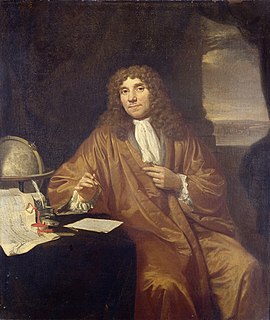Top 37 Quotes & Sayings by Antonie van Leeuwenhoek
Explore popular quotes and sayings by a Dutch scientist Antonie van Leeuwenhoek.
Last updated on November 8, 2024.
In treating of the oak, I have considered that the species of it growing in warm climates is superior to that which is produced in cold countries. But we must not imagine this to be the case with all woods; on the contrary, the fir timber grown in cold countries is superior to that produced in warm ones, where its growth is rapid.
People who look for the first time through a microscope say, 'Now I see this, and then I see that,' and even a skilled observer can be fooled. On these observations I have spent more time than many will believe, but I have done them with joy, and I have taken no notice of those who have said, 'Why take so much trouble,' and, 'What good is it?'
I now found that the spider cannot fix its thread to anything without imprinting the hind part of its body on the place, by which pressure it emits an incredible number of excessively small threads diverging in every direction from whence we may conclude that as soon as the threads are exposed to the air, they lose their viscosity or gluey quality.
If we now plainly perceive that the passage of the blood from the arteries into the veins of the tadpole is not performed in any other than those vessels, which are so minute as only to admit the passage of a single globule at a time, we may conclude that the same is performed in like manner in our own bodies and in those of other animals.
When I have supped too heavily of an evening, I drink in the morning a large number of cups of coffee, and that as hot as I can drink it, so that the sweat breaks out on me, and if by so doing I can't restore my body, a whole apothecary's shop couldn't do much, and that is the only thing I have done for years when I have felt a fever.
I observed certain animalcules, within whole bodies I saw so quick a motion as to exceed belief; they were about the size of a large grain of sand, and their bodies being transparent, that the internal motion could plainly be seen. Among other things, I saw in the body of one of these animalcules a bright and round corpuscle, placed near the head, and in which a very wonderful swift motion was to be seen, consisting of an alternate extension and contraction. This particle I concluded to be the heart.
The 4th sort of creatures... which moved through the 3 former sorts, were incredibly small, and so small in my eye that I judged, that if 100 of them lay [stretched out] one by another, they would not equal the length of a grain of course Sand; and according to this estimate, ten hundred thousand of them could not equal the dimensions of a grain of such course Sand. There was discover'd by me a fifth sort, which had near the thickness of the former, but they were almost twice as long.
The first time bacteria were observed.
[M]y work, which I've done for a long time, was not pursued in order to gain the praise I now enjoy, but chiefly from a craving after knowledge, which I notice resides in me more than in most other men. And therewithal, whenever I found out anything remarkable, I have thought it my duty to put down my discovery on paper, so that all ingenious people might be informed thereof.
The 31th of May, I perceived in the same water more of those Animals, as also some that were somewhat bigger. And I imagine, that [ten hundred thousand] of these little Creatures do not equal an ordinary grain of Sand in bigness: And comparing them with a Cheese-mite (which may be seen to move with the naked eye) I make the proportion of one of these small Water-creatures to a Cheese-mite, to be like that of a Bee to a Horse: For, the circumference of one of these little Animals in water, is not so big as the thickness of a hair in a Cheese-mite.
Examining this water...I found floating therein divers earthy particles, and some green streaks, spirally wound serpent-wise...and I judge that some of these little creatures were above a thousand times smaller than the smallest ones I have ever yet seen, upon the rind of cheese, in wheaten flour, mould, and the like.
Passing just lately over this lake, ... and examining this water next day, I found floating therein divers earthy particles, and some green streaks, spirally wound serpent-wise, and orderly arranged, after the manner of the copper or tin worms, which distillers use to cool their liquors as they distil over. The whole circumference of each of these streaks was about the thickness of a hair of one's head. ... all consisted of very small green globules joined together: and there were very many small green globules as well. [The earliest recorded observation of the common green alga Spyrogyra.]
I have divers times examined the same matter (human semen) from a healthy man... not from a sick man... nor spoiled by keeping... for a long time and not liquefied after the lapse of some time... but immediately after ejaculation before six beats of the pulse had intervened; and I have seen so great a number of living animalcules... in it, that sometimes more than a thousand were moving about in an amount of material the size of a grain of sand... I saw this vast number of animalcules not all through the semen, but only in the liquid matter adhering to the thicker part.





















